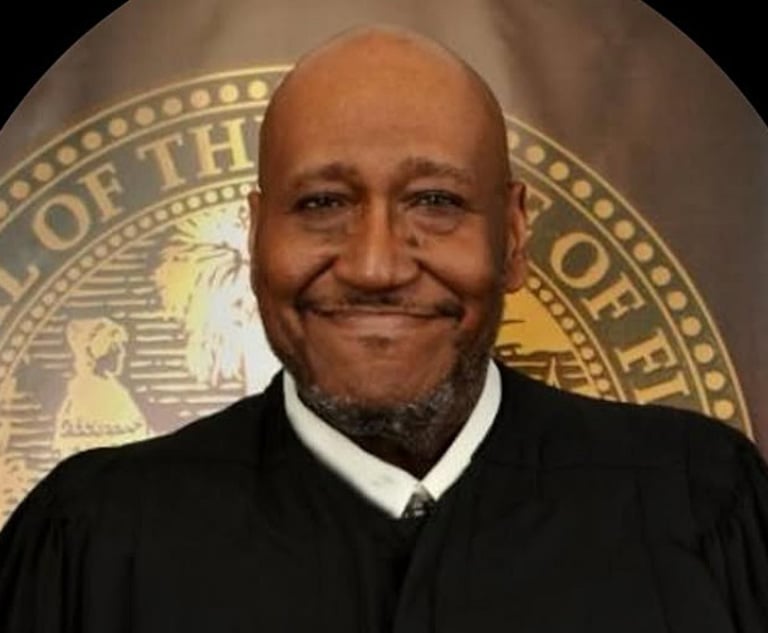 John Adams Courthouse, home of the Supreme Court of Massachusetts, and the Massachusetts Appeals Court. Photo: Swampyank via Wikipedia
John Adams Courthouse, home of the Supreme Court of Massachusetts, and the Massachusetts Appeals Court. Photo: Swampyank via WikipediaDecisions Have 'Real-Life Consequences': Juvenile Court Judge Considered for Appellate Bench
"I will always remember that the appeals that I hear and the decisions that we make have real-life consequences—not just on the parties or the litigants—but also on the trial court judges and how the decisions affect them on the front lines," Middlesex County Juvenile Court Judge Gloria Tan said regarding her nomination to the Massachusetts Appeals Court.
November 13, 2024 at 06:36 PM
4 minute read
Members of the Massachusetts Governor's Council expressed the willingness to back and elevate a sitting juvenile court judge to the state appellate bench.
If confirmed, Middlesex County Juvenile Court Judge Gloria Tan will be the only sitting justice on the Massachusetts Appeals Court with a juvenile court background. Tan, the first Asian American juvenile court judge appointed in Massachusetts, testified Wednesday before the Governor's Council following her nomination by Gov. Maura Healey.
"As a trial court judge, you're by yourself. You and you alone make the decisions and sometimes you have to make it quickly. I look forward to the opportunity to be able to take a step back and to really collaborate and work with the other justices on the panel," Tan told the council.
In the past few weeks, the Governor's Council has considered other candidates who will add to the diversity of the Massachusetts Appeals Court. Associate Justice Amy L. Blake was approved to serve as the first female to lead the bench, and Chauncey Wood was tapped to bring perspectives from the criminal defense side of law.
On Wednesday, Tan spoke about growing up in a rural Texas community, living in what may have been the "only Chinese family in town." But she said her differences helped her navigate different spaces and respectfully consider other opinions.
"This is something that's helped me through my professional life, whether it was as an attorney trying to get along with opposing counsel who might not agree with how a case should resolve, or as first justice in my county trying to mediate parking disputes. As anyone who works in a courthouse knows, parking and who gets what spot is one of the most contentious, controversial issues," Tan joked.
Over the past 11 years on the juvenile court, Tan has considered countless cases involving delinquent youth, parental rights and custody disputes, adoptions, among other delicate matters. While there were as many heartbreaking cases, Tan also spoke on the wins of closing cases following successful reunifications of children and their parents.
"If I'm confirmed to the appeals court, I'll no longer be in the courtroom seeing these cases up front and personal, but I will always remember that the appeals that I hear and the decisions that we make have real-life consequences—not just on the parties or the litigants—but also on the trial court judges and how the decisions affect them on the front lines," Tan said.
Tan said she hopes to be a resource and provide the appellate division with information about the juvenile court's function—a benefit considering the increasing number of parental rights cases that are appealed to the state's intermediate appellate court.
"I think actually any court benefits from having a diversity of experience and perspective, not just from juvenile court, but from all trial courts," the Yale Law School graduate told the panel.
Peter Agnes Jr., who retired from the Massachusetts Appeals Court in 2020, told the council that Tan was an "excellent" candidate. In addition to sorting through challenging factors while ruling on juvenile cases, Tan has also worked to bring important updates to the legal community, Agnes said Wednesday.
In 2008, the Massachusetts Supreme Judicial Court appointed an advisory committee to compile evidence law in an easy-to-use document as Massachusetts remains one of the only states that has not adopted a code of evidence similar to the Federal Rules of Evidence. When he became chair of the committee, Agnes nominated Tan to fill his vacancy, and she was approved. The committee collaborated to include need-to-know developments each year.
"Judge Tan immediately distinguished herself as someone who was not only competent in understanding what the law was, but wrote persuasively. In her oral presentations, [she] persuaded members of the committee to adopt her recommendations—and always in a very agreeable way," Agnes said. "From my experience serving on the appeals court, that's exactly what you hope a member of the appeals court will do. They will be competent and capable and persuasive, but also agreeable. You can even disagree agreeably, and that's important."
NOT FOR REPRINT
© 2025 ALM Global, LLC, All Rights Reserved. Request academic re-use from www.copyright.com. All other uses, submit a request to [email protected]. For more information visit Asset & Logo Licensing.
You Might Like
View All
2,000 Docket Entries: Complex South Florida Dispute Sets Precedent

Tributes Pour in for Pioneering Miami Judge, UM Adviser


Who Are the Judges Assigned to Challenges to Trump’s Birthright Citizenship Order?
Trending Stories
- 1Uber Files RICO Suit Against Plaintiff-Side Firms Alleging Fraudulent Injury Claims
- 2The Law Firm Disrupted: Scrutinizing the Elephant More Than the Mouse
- 3Inherent Diminished Value Damages Unavailable to 3rd-Party Claimants, Court Says
- 4Pa. Defense Firm Sued by Client Over Ex-Eagles Player's $43.5M Med Mal Win
- 5Losses Mount at Morris Manning, but Departing Ex-Chair Stays Bullish About His Old Firm's Future
Who Got The Work
J. Brugh Lower of Gibbons has entered an appearance for industrial equipment supplier Devco Corporation in a pending trademark infringement lawsuit. The suit, accusing the defendant of selling knock-off Graco products, was filed Dec. 18 in New Jersey District Court by Rivkin Radler on behalf of Graco Inc. and Graco Minnesota. The case, assigned to U.S. District Judge Zahid N. Quraishi, is 3:24-cv-11294, Graco Inc. et al v. Devco Corporation.
Who Got The Work
Rebecca Maller-Stein and Kent A. Yalowitz of Arnold & Porter Kaye Scholer have entered their appearances for Hanaco Venture Capital and its executives, Lior Prosor and David Frankel, in a pending securities lawsuit. The action, filed on Dec. 24 in New York Southern District Court by Zell, Aron & Co. on behalf of Goldeneye Advisors, accuses the defendants of negligently and fraudulently managing the plaintiff's $1 million investment. The case, assigned to U.S. District Judge Vernon S. Broderick, is 1:24-cv-09918, Goldeneye Advisors, LLC v. Hanaco Venture Capital, Ltd. et al.
Who Got The Work
Attorneys from A&O Shearman has stepped in as defense counsel for Toronto-Dominion Bank and other defendants in a pending securities class action. The suit, filed Dec. 11 in New York Southern District Court by Bleichmar Fonti & Auld, accuses the defendants of concealing the bank's 'pervasive' deficiencies in regards to its compliance with the Bank Secrecy Act and the quality of its anti-money laundering controls. The case, assigned to U.S. District Judge Arun Subramanian, is 1:24-cv-09445, Gonzalez v. The Toronto-Dominion Bank et al.
Who Got The Work
Crown Castle International, a Pennsylvania company providing shared communications infrastructure, has turned to Luke D. Wolf of Gordon Rees Scully Mansukhani to fend off a pending breach-of-contract lawsuit. The court action, filed Nov. 25 in Michigan Eastern District Court by Hooper Hathaway PC on behalf of The Town Residences LLC, accuses Crown Castle of failing to transfer approximately $30,000 in utility payments from T-Mobile in breach of a roof-top lease and assignment agreement. The case, assigned to U.S. District Judge Susan K. Declercq, is 2:24-cv-13131, The Town Residences LLC v. T-Mobile US, Inc. et al.
Who Got The Work
Wilfred P. Coronato and Daniel M. Schwartz of McCarter & English have stepped in as defense counsel to Electrolux Home Products Inc. in a pending product liability lawsuit. The court action, filed Nov. 26 in New York Eastern District Court by Poulos Lopiccolo PC and Nagel Rice LLP on behalf of David Stern, alleges that the defendant's refrigerators’ drawers and shelving repeatedly break and fall apart within months after purchase. The case, assigned to U.S. District Judge Joan M. Azrack, is 2:24-cv-08204, Stern v. Electrolux Home Products, Inc.
Featured Firms
Law Offices of Gary Martin Hays & Associates, P.C.
(470) 294-1674
Law Offices of Mark E. Salomone
(857) 444-6468
Smith & Hassler
(713) 739-1250








